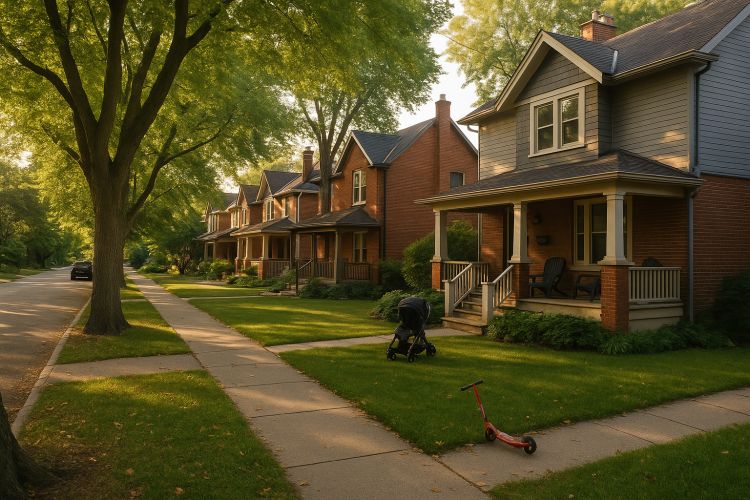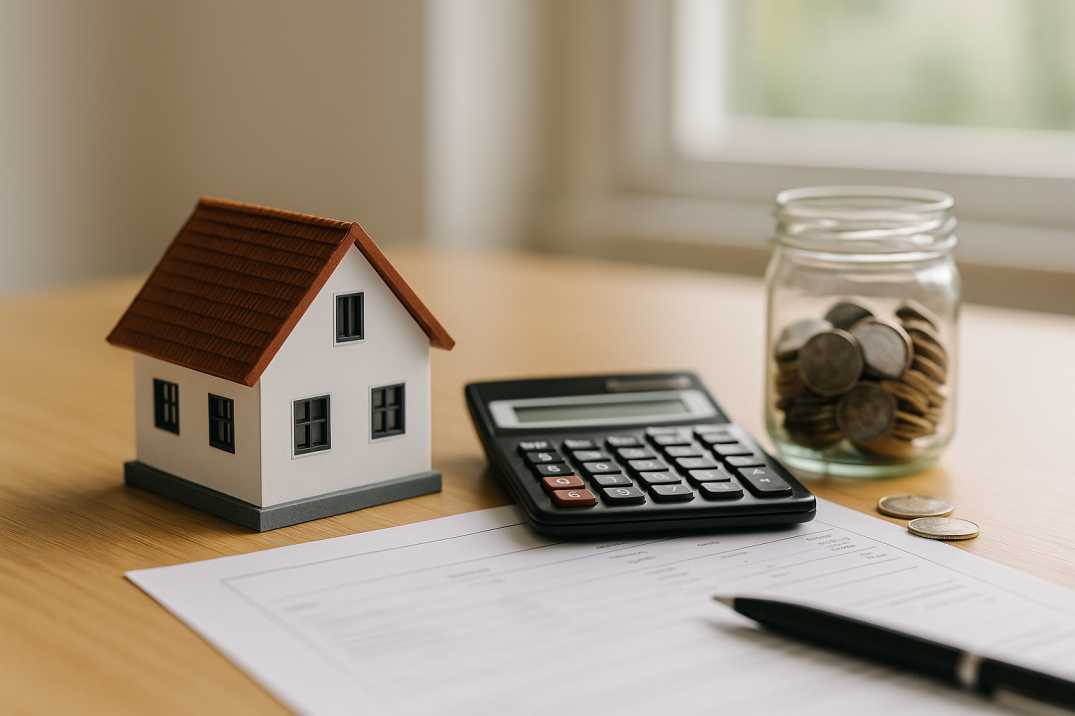The Toronto market has shifted significantly, creating new opportunities for prepared buyers. While challenges remain, today’s conditions offer advantages that smart first-time buyers can leverage when learning how to buy property in Toronto. In Nave Real Estate, we are with you with a complete guide to buying property in Toronto.
TL;DR: Your Toronto Home Buying Roadmap
- Current Market: Buyer-friendly conditions with more inventory and negotiation power than recent years
- Financial Preparation: Leverage FHSA (tax-free contributions and withdrawals) and Home Buyers’ Plan (access RRSP funds) for maximum down payment power
- Budget Reality: Plan for closing costs (1.5-4% of purchase price) beyond your down payment—legal fees, land transfer taxes, and inspections add up
- First-Time Buyer Advantages: Significant land transfer tax rebates available; new mortgage options with extended amortization
- Best Value Areas: East York, Scarborough, and The Junction offer community feel with better affordability than downtown
- International Buyers: Additional taxes apply, but exemptions and rebate programs exist for those becoming permanent residents
- Timeline: Get mortgage pre-approval first, budget 60-90 days for the full process, and don’t rush—preparation prevents costly mistakes
Toronto Real Estate Buying Process: What First-Time Buyers Need to Know
Toronto’s current market favours buyers more than we’ve seen in recent years. Understanding the Toronto real estate market trends in 2025 reveals increased inventory means more choices and genuine negotiation opportunities. However, this doesn’t mean the process is simple.
The biggest shift I’ve observed is cultural. Toronto’s incredible diversity means every family brings different approaches to buying a home in Toronto. Some cultures emphasize multi-generational decision-making, while others prioritize individual choice. Understanding these dynamics early helps align expectations and streamline decisions.
Market Reality Check:
- Properties are staying on the market longer, giving you time to think
- Sellers are more willing to negotiate on price and conditions
- Multiple offer scenarios, while still common, aren’t guaranteed
- Interest rate trends are moving in buyers’ favour.
The key is approaching this process with patience and realistic expectations. Your first home doesn’t need to be your forever home.

Steps to Buying a House in Toronto for First-Time Buyers
The home buying process in Toronto follows a logical sequence, but success depends on completing each step thoroughly before moving to the next. Most first-time buyers benefit from a structured approach that builds momentum while avoiding costly mistakes. Understanding the proper order of operations prevents delays and ensures you’re positioned as a serious buyer when you find the right property. Smart buyers also recognize that preparation time invested upfront pays dividends throughout the entire process. With current market conditions favouring buyers, taking time to do things properly becomes even more advantageous.
Getting Your Financial Foundation Ready
Before you start browsing listings, establish your financial baseline. This means understanding not just what you can afford monthly, but what programs exist to help first-time homebuyer Toronto residents.
The First Home Savings Account (FHSA) represents one of the most valuable tools available. You can contribute annually while getting tax deductions, then withdraw funds completely tax-free for your home purchase. Unlike other programs, there’s no repayment requirement.
The Home Buyers’ Plan allows you to access your RRSP funds for your down payment. Recent changes have made this even more attractive, with extended grace periods before repayment begins. The beauty of combining these programs is substantial—potentially accessing significant funds for your purchase. For complete program details and eligibility requirements, the Government of Canada’s official resources provide the most current information.
Don’t overlook family assistance. Many Toronto families, particularly those from cultures emphasizing collective support, contribute to children’s home purchases. This isn’t just financial help; it’s generational wealth building.
How to Get Mortgage Approval in Toronto
Mortgage pre-approval should happen before you start seriously house hunting. This isn’t just about knowing your budget—it’s about understanding your options and positioning yourself as a serious buyer.
Lenders evaluate more than just income. They look at employment stability, credit history, and debt obligations. For newcomers to Canada, building credit history early becomes crucial. Consider starting with secured credit cards or having Canadian co-signers if necessary.
Key Documentation to Prepare:
- Employment letters and recent pay stubs
- Two years of tax returns
- Bank statements showing savings patterns
- Immigration documents (if applicable)
- Gift letters for family contributions
The mortgage landscape offers new flexibility for first-time buyers, including extended amortization options that can reduce monthly payments significantly. These changes reflect current monetary policy trends that have created more favourable conditions for qualified buyers entering the market.

Understanding Down Payment Requirements
Down payment requirements vary based on purchase price. While the minimum is often achievable, saving more provides better mortgage terms and eliminates default insurance costs on higher-priced homes.
Many families underestimate the costs of buying a house in Toronto, which extend well beyond the down payment. Smart buyers budget for these additional expenses early in their planning process.
Closing Costs for a Toronto Home Purchase: What to Budget For
Closing costs typically represent a significant additional expense beyond your down payment. These hidden costs of buying property in Toronto aren’t optional—they’re mandatory parts of the buying process that catch many first-time buyers off guard.
Legal Fees and Professional Services
Ontario requires legal representation for property purchases. Your lawyer handles title searches, document review, fund transfers, and final registration. This isn’t just administrative work—they’re protecting your legal interests in what’s likely your largest financial transaction.
Home inspections, while not always mandatory, provide crucial protection. Professional inspectors identify potential issues that could cost thousands later. In Toronto’s older housing stock, this becomes especially important.
Land Transfer Taxes and Rebates
Toronto buyers face both provincial and municipal land transfer taxes. However, first-time buyers can access significant rebates that dramatically reduce these costs.
The rebate system recognizes that homeownership benefits communities. Take advantage of these programs—they represent thousands in savings and are specifically designed to help first-time buyers enter the market.
Best neighborhood’s to Buy in Toronto 2025
Choosing the right neighborhood represents one of your most important decisions, as it affects your daily life, commute, and long-term property value. Toronto’s diverse neighborhoods each offer unique character, amenities, and value propositions for first-time buyers.
Current market conditions have created opportunities in areas that were previously out of reach for many buyers. The key is balancing affordability with lifestyle priorities while considering future growth potential. Smart buyers also factor in cultural fit, especially in Toronto’s multicultural landscape, where community connections can significantly enhance quality of life.
Value Areas for First-Time Buyers
East York continues attracting first-time buyers seeking a community feel without downtown premiums. The area offers excellent transit access, established infrastructure, and genuine neighbourhood character. Families appreciate the green spaces and strong school options.
Scarborough provides diverse housing options and cultural communities. The area’s transformation continues, with improved transit connections making downtown commutes more viable. For families valuing space and community diversity, Scarborough offers compelling value.
The Junction represents Toronto’s artistic renaissance. This area combines creative energy with family-friendly amenities. Young professionals and families appreciate the unique character and ongoing revitalization.
When considering the pros and cons of a condo vs. a detached home in Toronto, location plays a crucial role in your decision-making process.
Transportation and Infrastructure Considerations
Transit access directly impacts your daily life and long-term property value. Consider not just current commute times but also planned infrastructure improvements that could enhance connectivity.
Proximity to schools, healthcare, and cultural amenities varies significantly across Toronto neighbourhoods. Prioritize what matters most to your lifestyle and long-term plans.

Special Considerations for International Buyers
International buyers and newcomers to Canada face unique challenges and opportunities in Toronto’s real estate market. Understanding the regulatory landscape, tax implications, and cultural differences early in your planning process prevents costly surprises and delays.
Recent policy changes have created both obstacles and advantages for foreign buyers, making professional guidance essential. Many international buyers also benefit from connecting with professionals who understand their specific cultural and financial backgrounds. The good news is that Toronto’s diverse real estate community includes many experts who specialize in helping newcomers navigate the process successfully.
Foreign Buyer Rules Toronto Real Estate
Non-residents face additional taxes that significantly impact purchase costs. However, various exemptions and rebate opportunities exist, particularly for those planning to become permanent residents.
Understanding these rules early prevents costly surprises. The landscape includes both provincial and municipal taxes, creating complex calculations that require professional guidance.
Newcomer Navigation Strategies
Building Canadian credit history takes time, but strategies exist to accelerate the process. Consider secured credit products, utility bills in your name, and maintaining consistent banking relationships.
Cultural differences in negotiation styles, family involvement in decisions, and long-term planning approaches are all normal. Learning how to negotiate a house price in Toronto requires understanding local market customs and working with professionals who understand and respect cultural differences.
Common Mistakes and How to Avoid Them
Learning how to avoid pitfalls when buying property in Toronto starts with understanding the biggest mistake I see: rushing into the market without adequate preparation. Taking time to understand the process, build your financial foundation, and clarify your priorities always pays dividends.
Emotional decision-making during bid Costs for awards lead to overpaying or compromising on essential features. Set clear criteria beforehand and stick to them.
Many buyers underestimate ongoing homeownership costs. Property taxes, maintenance, utilities, and insurance add up quickly. Budget conservatively to avoid financial stress after purchase.
Your Path to Achievable Homeownership
Successfully buying your first home in Toronto requires patience, preparation, and realistic expectations. Today’s market conditions, combined with available first-time buyer programs, create genuine opportunities for those willing to approach the process strategically.
Understanding how to buy property in Toronto involves more than just financial preparation—it’s about navigating cultural considerations, legal requirements, and market timing. This Toronto property purchase guide demonstrates that homeownership represents more than just a purchase—it’s a long-term wealth-building strategy and a foundation for your future in one of the world’s most dynamic cities. With proper preparation and professional guidance, your Toronto homeownership dreams are not just achievable but inevitable.






